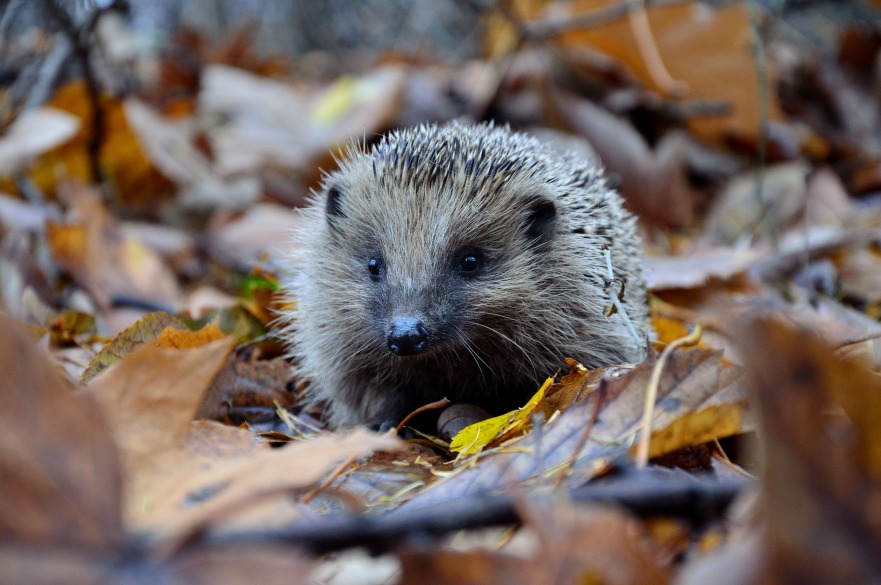Hedgehog road safety in primary schools
NTU PhD student Lauren Moore has been using her research, alongside ARES alumna and NTU Sustainability Assistant Jemma Maguire, to enlighten and inspire children at three primary schools in Nottinghamshire to learn how to better accommodate wildlife in their gardens, schools and villages.
By Laura Phillips | Published on 9 December 2022
Categories: Environment and sustainability; School of Animal, Rural and Environmental Sciences;

Cue Lauren Moore, a PhD researcher at Nottingham Trent University (NTU) studying road ecology, with a focus on hedgehogs; and Jemma Maguire, an MSc Biodiversity alumna, and NTU's Sustainability Team Hedgehog Champion.
Over recent months, Lauren and Jemma have led assemblies and workshops about hedgehogs at local Nottinghamshire primary schools St Michael's Primary School in Farnsfield and Kirklington Primary School (both in the villages where Lauren completed her PhD fieldwork).
Lauren and Jemma also visited St Peter's CofE Junior School in Ruddington, NTU’s partner school in the Hedgehog Friendly Campus scheme, a nationwide scheme detailing actions for campuses/ schools to help hedgehogs with the food/ shelter/ wild areas that they need to survive. NTU is on track to achieve the Gold award this year.
The sessions Lauren and Jemma have been leading include teaching children how to help hedgehogs at home and at school, school-wide competitions for wildlife-friendly garden designs; and completing audits of the school grounds to help them support wildlife. St Peter's Junior School have also included a book on hedgehogs and roads in their curriculum.
Lauren explains: “The workshops were centred around teaching the children about the biology of hedgehogs – and associated fun facts – why they are in decline, what NTU are doing to help the species as part of the Hedgehog Friendly Campus scheme, and most importantly, how the children can also help hedgehogs both at school and at home.
“The competition we’re running with St Michael’s Primary School is all about the changes that the children can make to the green spaces around them, such as gardens or parks. Following a school assembly that gave an overview about hedgehogs in the village – using my PhD data – each class had a workshop centred on designing their garden to be as wildlife friendly as possible. We had money donated to us by the local Southwell and District Lions Club to buy some prizes for the winners.”

Hedgehog populations have been in decline over the past few decade, primarily due to habitat loss
As Lauren’s PhD research centres on understanding the decline of hedgehog populations and what solutions are available to reverse the negative trends, particularly in Farnsfield and Kirklington, she knows exactly where hedgehogs spend their time in these villages, and how big, small, and healthy the populations are.
“It was great to be able to share information, photos, and videos of the hedgehogs on their very doorsteps and on their school fields with them – a really unique experience!
“Specifically, my project focuses on the impact of roads on hedgehogs because roads are implicated in the decline of hedgehogs. All three schools are surrounded by busy roads known for being dangerous to hedgehogs, so we had excellent discussions with the children on the solutions around this and how to keep hedgehogs safe.”
Lauren continues, talking about why she believes it’s important to engage with younger audiences about topics such as hedgehog awareness: “I think it is incredibly important to engage with younger audiences on all topics of wildlife conservation and sustainability because doing so can encourage and inspire everyone to make a difference in their own way. It’s a great way to show that caring for the planet is not one person’s responsibility, it is everyone’s.”
Lauren also comments on why she feels it is useful for universities to engage with younger audiences: “In my opinion, engaging with younger audiences is a critical part of Higher Education. It offers a vital platform for knowledge transfer that they can use in their everyday lives. Beyond this, engaging younger audiences gives them ideas of possible career paths and shows them that they can make positive real-world impacts.”
“This is especially the case with young girls and all of the possible STEM careers available to them. The faces of the children lit up when I was introduced as ‘a scientist’.
“For me, it is about being a positive role model for future generations. In the feedback from a teacher at St Peter’s CofE Junior School, they said that they were particularly pleased to see a positive example for the children in the field of STEM.”